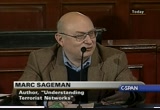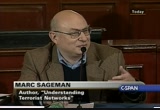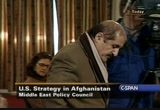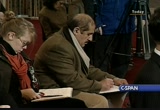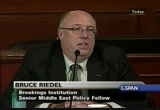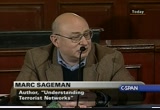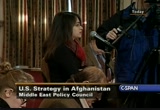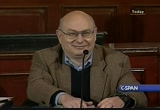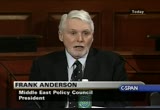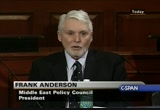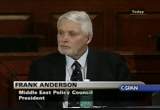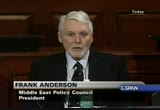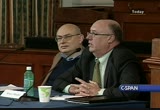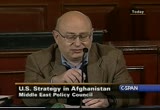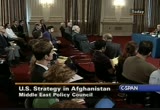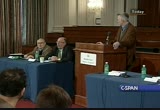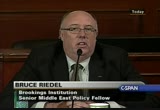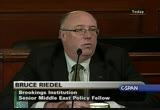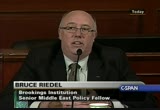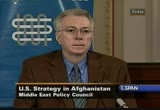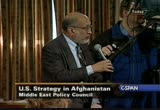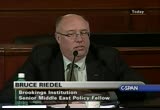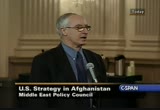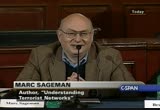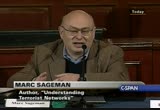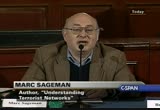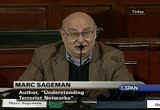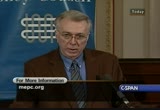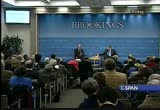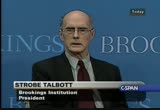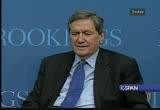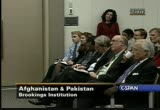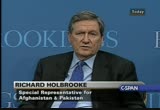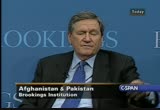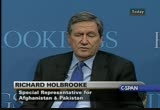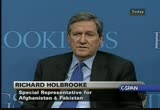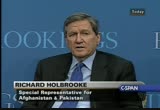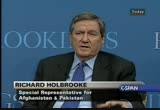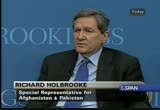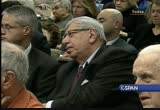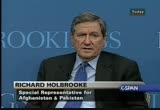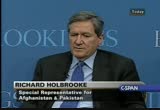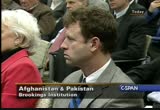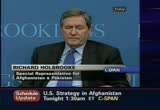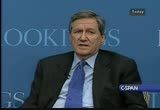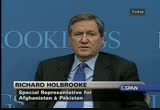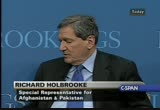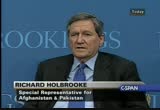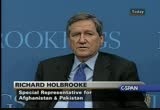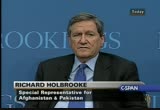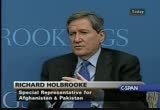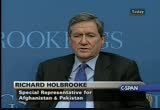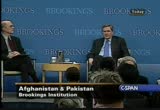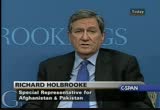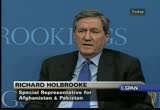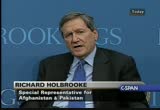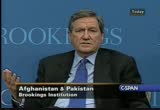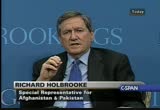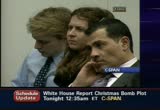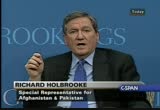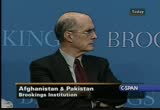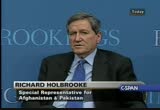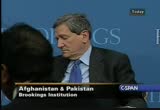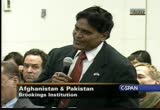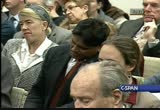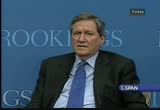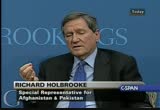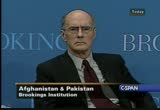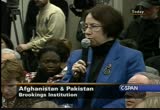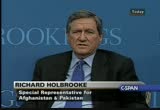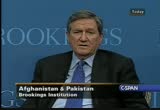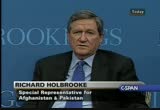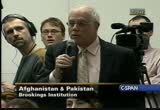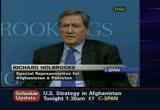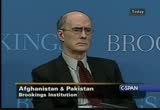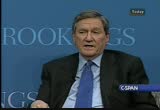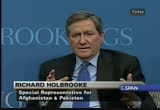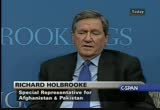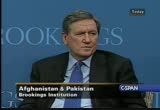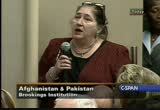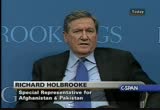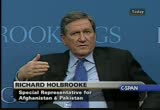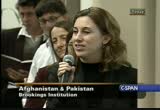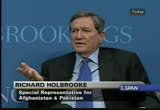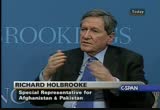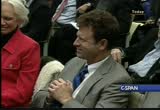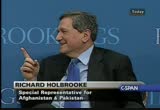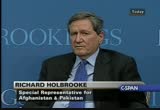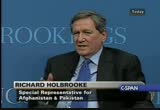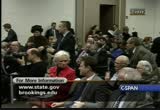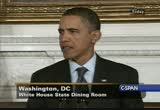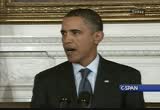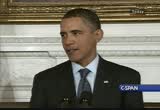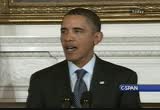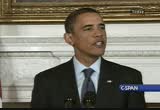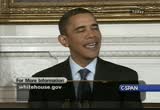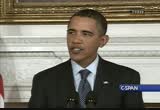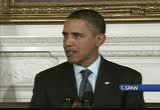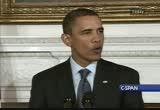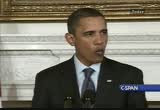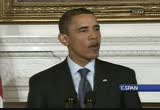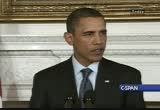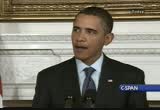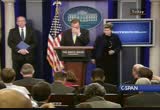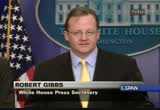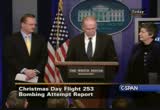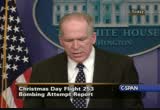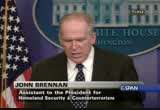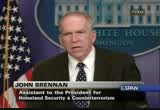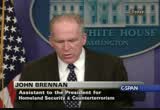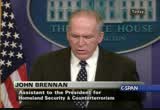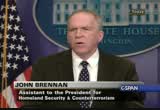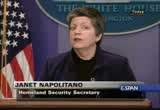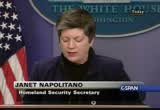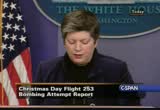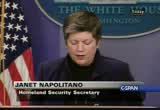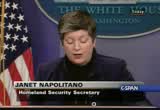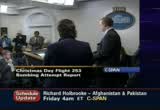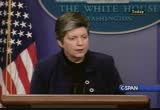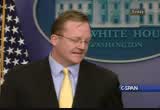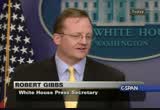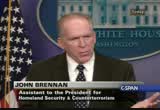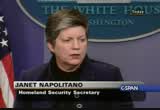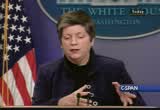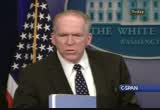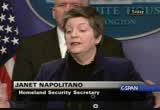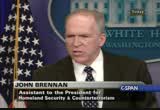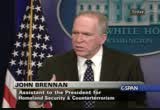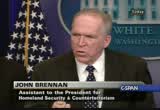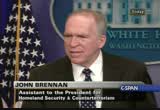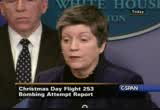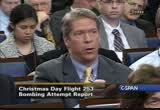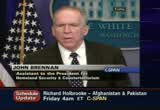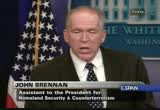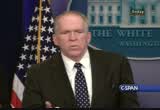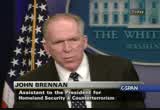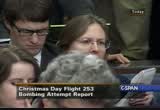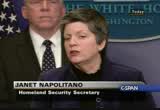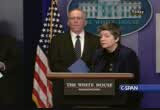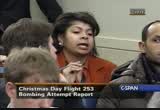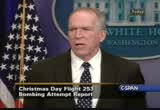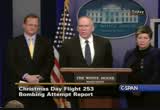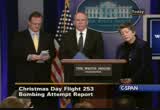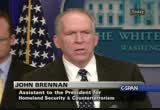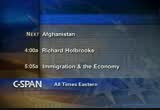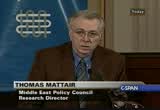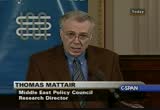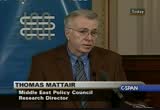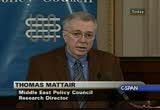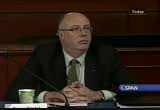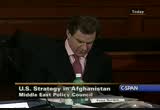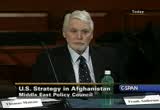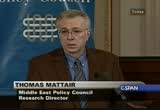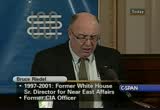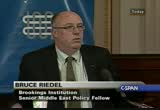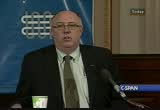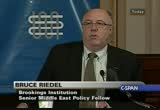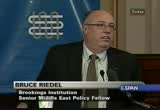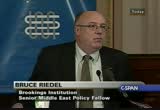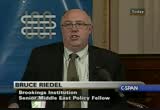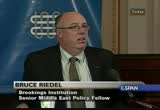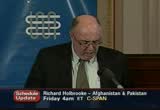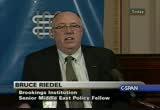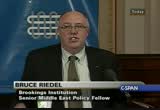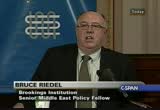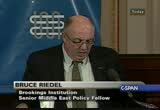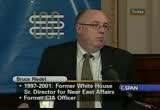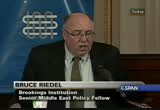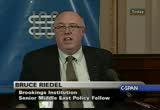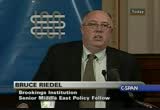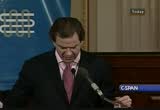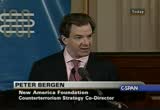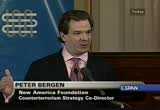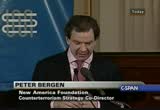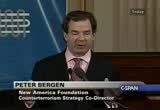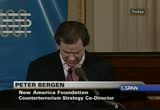tv Capital News Today CSPAN January 7, 2010 11:00pm-2:00am EST
11:00 pm
my question is regarding strategic communication in afghanistan. peter talked about afghanistan in -- afghani opinion polls, however, our popularity has decrease over the years as our words and actions have not actually mass. they would try to build schools and hospitals but completely alienate the population by flattening of village and create -- where the mujahedin had fired on them. general mcchrystal has tried to remedy this recently, but the insurgents have been good at exploiting civilian casualties and diminished expectations. i was wondering how important he thinks strategic communication is overall in afghanistan and what you think we might be able to do better.
11:01 pm
thank you. >> strategic communication is always secondary, tertiary to bullets. if you kill a family member, i do not really care how good your strategic communication is. . . . how you spin that action. and in a sense, it can't really come from us. it really has to come from local discussions by afghans about what we have done or not done. on the positive side, we have not kills as many people as soviets did by 1.5 million estimate during the tenure there. we have done far less damage. therefore, we're not at the low point of the soviet's war when they decided counterinsurgency.
11:02 pm
they decided counterinsurgency. but, you k about strategic communication is always secondary to the facts under ground. and especially the images on television. and right now in afghanistan, television is a very competitive business. and it allows all kinds of rumors and plots and all kinds of nonsense to be shown on tv. that's going to trump whatever we're going to do. so it's a very hard task, whoever is doing that, i think it's almost an impossible task. but the fact on the ground always trump whatever you say. >> yes? >> again, from vice of america, president obama when he delivered the speak about the
11:03 pm
strategy -- youth strategy in afghanistan. he said that youth had the partnership with pakistan and we will not leave alone our partners. many afghan analyst, or some of them at least, they fear that after 18 months the situation of '90s when the soviet soviet union left, to be left alone to its neighbors. what do you think about that? >> i think if you look at what the president said at west pointe and how he and his advisers have qualified that since, mid 2011 is not the point at which 140,000 nato soldiers magically disappear from afghanistan and start coming home. it's the point at which we
11:04 pm
aspire that we will begin what i think will be a very slow, very small drawdown. here i think marc and i disagree. i don't think the politics of this in the united states are going to force this administration to draw down substantially before 2012. one thing i think is certain, we certainly will not have achieved lasting security change, if that's the case. what i do think is this, i think that by mid 2011, we will have a pretty good idea whether or not this strategy, the mcchrystal strategy, the obama strategy, has a chance of succeeding. if by the middle of 2011, which will be 12 months after we've gotten all of the forces or at least most of the forces in the theater, we've ramped up civilian advisers to around 1,000 or so at beginning of 2009 we've begun working regional
11:05 pm
diplomacy. if by mid 2011 we don't see any sign of change, then we've learned something. the patient was dead. president obama inherited a dead patient on the table. and we cannot rebuild the avenue -- afghan state. if that's the case, we're in a difficult situation. there's no simple, let's say let's all come home. pretend it's not a problem. more will probably not be the answer. staying on indefinitely will not be the answer. and quitting will not be the answer. one thing i can say for sure is i sure hope president obama doesn't ask fe more another strategic review at that time. >> let me make a small comment. the soviets withdrew in nine months. they lived next door.
11:06 pm
that was a tremendous, tremendous logistic feat on there part to be able to do that. you don't know the difficulty involved in withdrawing 100,000 people that they had. and they were again next door. if you look at logistics to afghanistan by a large military as opposed to insurgents, you realize the two major roads. one is to the north and the orr the jilalabad. you just need to hit the first car and the lashkar. and those guys get stuck. there's no side roads. to think that we can withdraw
11:07 pm
rapidly is complete nonsense. >> hello, i'm with the "washington quarterly" at cis. every since obama has come into office and his speech on november 1 about the troop surge, comparisons have been drawn with vietnam. though we heard the comparison with the soviet invasion, i was just wondering what all of your views were on vietnam, and whether they are comparable or what ways they may not be? >> wow. i think we'll defer to frank who was old enough -- [laughter] >> to do that. but, you know, in a sense, the war in vietnam was fought against. we withdrew because of domestic reasons.
11:08 pm
not so much what happened in vietnam. the soviets also the same thing. they did not lose a single encounter to the afghan jihad while they were there for almost ten years. major encounter. in vietnam, we didn't really lose any major encounter to the north vietnamese. the war will be fought within washington. we're fighting two wars. you have to really look at both of them together. >> there's a -- i think there's a very important disof text between vietnam and afghanistan. vietnam was bipolar. you know, the country was either inform support of what had been the republican of vietnam and alliance with the united states or was in support of the legacy
11:09 pm
of min. i think there was a reluctant reliance with the soviet block. they were united with -- they became united around an anti-colonial ideology. they were willing to take -- they were disciplined enough to take enormous losses. and in the end, they were able to put together a conventional force. we were never defeated by the vietcong. they drove tanks in. i don't dot math on how many
11:10 pm
partners there were. and i would argue that what's going to happen -- i might take issue with marc on this. it might depend on as much as what happens in afghanistan as it does on what happens in washington. afghans in their multiplicity of institutions and associations and relationships really want what almost anyone wants. that is security and the opportunity to protect and grow one's family. we're in trouble in the south of the country right now. that's security is more provided in taliban areas than it is in those that are friendly to the government. that's not the case throughout the rest of the country. and the afghan government right
11:11 pm
now is not the friend of most villager in southern afghanistan. it's not the enemy, it's just this force that has organizized the top-down corruption. you know? local officials are paid for their position, and there's a flow upward of resource that is are extracted from the people to corrupt politicians in -- well, farther up the stream. than doesn't -- that doesn't have to continue. khzaei -- karzai was a great hope. everyone no knows him respected him. he might change his mind. the pressures that led him to permit and maybe support this
11:12 pm
corrupt structure could be reversed over time. the people up and down that structure might change their mind. the parliament is -- has stood up against his nominations. who's knows who's going to happen up and down that road. if we succeed in something that we can do, peter has pointed out the crucial important to the kandahar road. than doesn't be impossible to secure that. that changes the economic nature of southern afghanistan. it could get better. >> if i could just add one point. there's no question that the ghost of vietnam haunts this administration. i can tell you from being in it for 60 days. the ghost of what happened to lyndon johnson walks the corridors of this white house,
11:13 pm
it walks the corridors of this building every day. it's a mistake. we got to get over it. we got to stop fighting the vietnam war. i don't know whether we could have won or not, but it is not relevant to afghanistan. as marc pointed out earlier, there is no superpower supporting the taliban. there are no stingers going to come to the taliban. there's not soviet union and communist china behind the taliban. equally, afghanistan is not iraq. let's not refight the surge arguments of 2007 and 2008 over in afghanistan. general petraeus is the first to say, the lessons of iraq are not going to be applicable to afghanistan. these are two fundamentally
11:14 pm
different countries. i know all of asia looks like one big thing to america, but we have to be a little bit more sophisticated, yemen, somalia, afghanistan, iraq, vietnam, are not the same exact problem. as frank very wisely told us at the beginning, we need expertise at the intimacy of the problem. >> let me add to that. you know, when i talked to officials -- real officials in washington here. i'm always amazed by their sophistication of their understanding of the issue. that does not trickle down to the newspapers. that does not trickle down to msnbc, that doesn't trickle down to fox news. unfortunately, people vote fox news and msnbc.
11:15 pm
here you have the economy of people that are no better, but can't really say much on tv which is so polarized. and i completel afghanistan is not vietnam, is completely irrelevant to vietnam. the news media is making it so. >> as we get a little closer to the end of the session, let me come back to a more general question. bruce, you were quoted in the newspaper may be in september, saying that a successful counterinsurgency strategy required a partner that is viewed as legitimate. and you have said that it is an illegitimate government. and yet, you also were quoted in
11:16 pm
the paper as saying that the administration should givemcchrystal -- give mcchrystal what he wanted. think counterinsurgency is necessary and why the more limited counterterrorist strategy of going after terrorist leaders with special forces is not going to be sufficient? >> certainly. it's -- i'm not the only person who has said the successful counterinsurgency requires a partner. i think that's kind of the essence of the whole theory of counterinsurge -- counterinsurgency. the national community's handling of the afghanistan presidential election was a major, major setback for us.
11:17 pm
i'll go further. we acted throughout the whole summer around this election like a deer in the headlights. we could see a problem in front of us, we saw it roars down the highway. it slammed into us, and we seemed to just stand there. that is a major mistake. and it is not clear to me that we can recover from it. i think that there is a possibility to recover from it. because i don't think we could vilify and demonize president karzai. his opportunity to fork deals in administration is much more sophisticated than ours. his opportunity to reach out to his opponents is much more sophisticated than ours. he has some very, very good people in his cabinet. fortunately, the parliament was small enough to recognize those people and to put them back into office. but trying to get an effective
11:18 pm
afghanistan partner is going to be very hard. we have set ourself back by the handling of the afghanistan presidential election. the reason i don't think the so-called counterterrorism light strategy works is because i think it's based on a false premise. that you can encourage afghans and pakistanis to give you the kind of critical human intelligence that you need for the drones to work when you don't provide them with any security or any incentive to work with you. my colleagues here have spent a lot more times in running assets than i have. but i don't see how we're going to persuade someone to go out there and risk his life if the message you sending him is i'm not going to be here when you come back. but i'll leave you a cell phone. and you call me with the targets. counterterrorism light is a
11:19 pm
fantasy strategy. it says more to tom clancy novels than to reality on the battlefield. look at the coast operation. i don't know exactly what the people in that forward operating base were doing. but i think you can surmise one thing. they were the eyes and ears of the human intelligence collection program that was working to make the drones succeed. if you adopt the light approach, you don't have forward-operating basis. so where are you going to be meeting with your assets? where are you going to be developing that human intelligence? last point about it, if we adopt the approach that we're in afghanistan and pakistan to stay whack-a-mole with terrorist, why the are afghanistan and pakistani government say come on
11:20 pm
in. we'd love to have you here. you're doing nothing for me. it's all for you. it doesn't make any sense. by the way, our 44 partners in isaf are going out the door. don't stand in the doorway, you are going to get hit by it as they evolve through it. >> just one quick question. all of us here, you panelist, emphasize the question of some democracy in pakistan, afghanistan. now, do you realize the perspective from the other side? that our colonial powers want democrattive governments. the colonial power of israel.
11:21 pm
that on the other hand, the message to them really doesn't flow from democracy which to us the tribal leadership and ethnicity and religion. so hamid karzai maybe corrupt or he may be a saint. it's not our association with him, telling his legitimacy in the eyes of the people, just as in pakistan. he was elected by the majority. he is now 19% approval rating. it is because of his allowing the tax. are we not going to let their institutions, their leadership, maybe we have to talk with mullah omar? >> does anyone want to take
11:22 pm
that? >> i speak to it for a second in pakistan. you're absolutely right. president's popularity, not anything to do with mr. 10% himself has gone through the roof. you will probably see the end of the zardari government. each time we have ended up pretty unhappy with the outcome. and the pakistani people have ended up pretty unhappy with the outcome. we've talked a lot about polling. and i'm skeptical about polling in illiterate societies as i think anyone is. but there is interesting polling in pakistan that says despite the fact that the country now
11:23 pm
has an anemic economy, despite the fact that the violence is unprecedented levels, the overwhelming majority of pakistan, something around 85% say they do not want to have another military dictatorship. >> i think we have time for one more question if anyone has one. >> given the composition of the panel, i can't resist asking for your assessment of the after-evaluation of the amsterdam to detroit incident. obviously, most of us are sophisticated enough to know that success stories all have to be kept secret. failures get magnified. have we made progress in terms of the standing up of the
11:24 pm
structures to prevent these kinds of incident since the restructuring after 9/11? i mean. >> well, this is a very interesting question. everything worked. but the system failed. that's because the system is no good. the father of omar went to our embassy and told us he thought his son was a terrorist. he was afraid of that. the folks, my understanding, they wrote back and said this guy may be a terrorist. the guys back home said, oh, okay. so we're going to put him in our database. and we did.
11:25 pm
everybody was going the bureaucratic thing. but the system doesn't really work. because it only works if you have inquisitive people back here. this is kind of interesting. let's see that. it don't have that initiative. everybody is basically doing cya work. you do this. you do that. and it's nobody responsibility. i don't think the system works. i think we're going to see a reevaluation of that system very soon. and we're trying to plug in this notion. my, you know, the model that may work is what israelis have been doing in terms of air transport.
11:26 pm
they take young people, usually at universities, physician, lawyer, law students, medical students, at the airport. have them talk to all of the passengers coming in. just talk. and those kids are young, they are 20, they are very curious, and if a story doesn't make sense, they keep on asking questions. until they -- you know, it's the sense of curiosity. if it doesn't make sense. those kids burned out very fast. they usually let go after one year or two. and they never stay for long. they are not professional people like tsa or elsewhere. it's really the sense of inquisitiveness. we just have bureaucrats working now in counterterrorism. we don't have the sense of
11:27 pm
inquisitiveness. all of this putting data in large data set is going to prevent up. i mean prevent the next terrorist attack. this actually was a very sophisticate thed act. the amount of explosive that was sown into the underwear was three pacts of sugar, the equivalent, 80 grams. it's really three ounces. you talk about minute thing that you would not have discovered if you padded down the person. the initiative of his daughter should have been followed up. and maybe design a system where the person himself drives the system. so that if something like that is going obvious, you -- on, you are immediately check the
11:28 pm
database. is he in the united states? if he has a visa, you cancel it. if he wants to come here, that act drives the system to perhaps respond. but right now i don't think the system works. >> thank you. i'm afraid we're out of time. i'd like to thank the panel and thank the audience for coming. let me ask one more time, take a look at our web site www.mepc.org. take a look at our journal and other programs we offer. thank you for coming. [applause] [inaudible conversations] [captioning performed by national captioning institute] [captions copyright national cable satellite corp. 2010]
11:29 pm
>> up next on c-span, richard holbrooke, u.s. special representative for afghanistan and pakistan. and we will hear from president obama and homeland's security -- homeland security head janet napolitano. and later, a discussion about obama administration policy in afghanistan. on tomorrow's "washington journal." republican national committee chairman michael steele. a look at the latest unemployment figures with marilyn geewax. and we will discuss counter- terrorism efforts with juan zarate.
11:30 pm
richard holbrooke talked about u.s. military and economic recovery efforts in afghanistan and pakistan at a brookings institution for on this afternoon. he is the president's chief adviser in that region, and a long-term u.s. diplomat. this is about one hour. >> good afternoon, everybody. we're very honored and appreciative that ambassador holbrooke took some time off from his duties on the other side of town and being on the other side of the world to spend about one hour with us this afternoon talking about policy in afghanistan and pakistan. there are never boring moments in his life. there certainly haven't been any in the course of the time that he has had this job. i figured that was a figure that i was doing you. that i was doing you.
11:31 pm
you could use a little more. of course, this is a particularly busy week and a particularly difficult week. ambassador holbrooke has got a number of members of his terrific interagency team with him here. and one of the very promising and productive aspects of the way he's going in which the interagency process works together. we're glad you have some of your team here. i know a number of the team lost some friends as a result of the terrible suicide bombings in afghanistan. that's one of several notes in a minor key that we have to take account of. i thought maybe, richard, if it was okay, we'd start what we hope will be an open and lively discussion here just by giving you a chance to tell the group what you think among all of the issues that are out there are the most important ones.
11:32 pm
and what are the two or three subjects on which you think that we and, therefore you, are going to be most concentrated on particularly during the period immediately ahead? >> thanks, strobe. thank you for inviting me. full confession, the man to my right is one of my closest friends ends most severe critics. if you sense a rapport between us, we've been friends since 1978. >> same can be said in the other direction. >> it's just a great pleasure to be introduced by strobe. knows strobe, you know i will not diminish in one iota his intense interrogatory style. i sense so many of my friends. i'm grateful to see you all. i want to acknowledge when i
11:33 pm
first met in the johnson administration who was secretary of the army and great figure in the national security history. i won't acknowledge anyone else in the room. but i see tons of people i work with. my own team, i only brought a few people today, strobe, but since you mention them, i should mention on the wall there is roman who is our ngo outreach. i want to start with him. i think we're the only office with the building withs own ngo. there are 1,000ngo's working in afghanistan and pakistan. not counting local. there was no road map. there was nothing to tell us what they did. roman is doing a cross hatch computerization and we are reaching out to ngos. for example, water is a huge issue in both countries. he will be able to tell us which ngos in the united states work on water, which are working in
11:34 pm
afghanistan and pakistan and so on. so next to him, ashley boomer, who's been with me now for a decade. and has been in the current capacity a specializing on the all important issue of communications and counterpropaganda. this war is a war of information. and it is always been most extraordinary to me the that area is where the world's most -- the world's leading communication nation, the united states, has been at least until recently outcommunicated by mass murdered living in the most remote areas of afghanistan and pakistan. and we have to take the public information space back from the enemy in order to succeed. and ashley is pioneered such creative ideas as using cell phone technology and such obviously ideas as countering their abuse of low wattage fm
11:35 pm
station to say terrible lies. next to her, is valley nee 15. he came to us from and has just written another one of the wonderful books. he was working on pakistan for us and not on iran, since that always appeared in the blogs inaccurately. i think we are missing someone. tim who came to us from afghanistan. a representing the future of the foreign service. we have a whole lot of other people in the back there, including in the department, from nine other agent sis plus the state department. strobe, what i'd like to say,
11:36 pm
the most common question i get in when i walk down the street or run into people is the most valid. why are we in afghanistan? that's a fair question to ask in a situation as complicated and difficult as this. this is not an easy situation. a year ago barack obama inherited the situation. and he faced several choices. so we went through a complicated policy review. which some of you in this room contributed to. and one person this this room led, bruce riedel. he was the chair and i was the cochair. and i thank bruce again here in the front row. i thank bruce again for his response to president obama's call which came on the third day of the administration. and bruce gave us 60 days. i thank strobe for lending him to us. and we concluded quite simply
11:37 pm
that america's basic national security interest were at stake in these two countries. this was not enough where the vietnam posed no direct threat to the american homeland. it was not iraq, where saddam hussein had attacks on our countries, including pakistan itself has been planned. the people out there said they would do it again, very clearly, as the near miss on christmas day demonstrates. in fact, this particular person was not trained, and pakistan does not change the fact that the inspiration for all of this comes from al qaeda and al qaeda's leadership is based in the remotest areas on the afghanistan/pakistan border. so we concluded without any dissent that this was a national
11:38 pm
security issue. we could not walk away from it. the second question was therefore, what do we do about it? the answer has been laid out in a serious of speeches and public states by president obama march 27th and december of last year were the two major statements. but there's been many others. i've been out there saying, the military has, hillary clinton, bob gates, vice president biden. the press reported special discussions in which people put forward a variety of views both in february, march, and again in the extraordinary intense policy review process which i participated in august which came to culmination. so let me be very clear on this. having served every democrat president from washington during the white house in the senior state department. it is when you don't have discussions of a range of options in the room that you
11:39 pm
should ask questions. and it was to the enormous credit of this administration and to president obama that every view that y'all in this room are likely to hold was put forward inside the windowless room in the basement of the white house. so the president had the full range of views as he set forward first in march and february to send 21,000 troops, including 4,000 training troops. and then in december when he allowanced -- announced 40,000 more. it is the part the press is focused on. it's not the part i'm directly responsible for. i made inpotents that discussion. but our job is the civilian side of the war. from communications to agricultural from rule of law to subnational governance. to education and health. and that's what we do. plus the diplomatic side of
11:40 pm
things. i want to underscore that we are there because our national interest are at stake. we know how difficult it is. and our allies in the region now how difficult it is. i have toured now every single country in the region even and outside the region that might be affected expect your three favorite, turkmenistan, tay vehicle stan, and which i will go in the next month. without exception, every country agrees on what's happening in afghanistan is a direct vital strategic interest to them as well. i need to underscore that from beijing to moscow and abu dhabi and including all of the states in the gcc all agree that stability in afghanistan and pakistan is critical in a
11:41 pm
strategic sense. so we conclude as well that what happens there is not just vital to our own homeland security, it's also vital to an extraordinary large range of countries which includes the two most populous countries in the world, it includes russia and the world's largest oil areas, and a whole range of other issues. and there are obviously implications for other problems we face to the east. and in iran and in regard to the arab israeli issues. so the 30,000 troops that started to deploy, on the civilian side, we build up rapidly last year. i want to underscore again on behalf of the department of state and secretary of state that when we came in office, there were 300 civilians. not a lot, considering the importance of the country.
11:42 pm
when i was ambassador of germany, there were 2500 people. we had 300 civilians in afghanistan. we tripled it last year. and that growth will continue as the troops build up. we are working out the details now. we're working closely with deputy secretary of state jack jack lew. there will be a big build up. the new administrator is being sworn in. and he and i are already collaborates. we will have a press conference after this joined by tom vilsack, the secretary of agriculture. why agriculture? because it's the most important nonsecurity program. tom vilsack will be leave shortly. exact time withheld for security reasons. i hope you'll respect that. to further or very ambitious
11:43 pm
goals to help afghanistan. so we have a vast array of civilian programs. we have an expanding dialogue on international diplomacy. i got back late last night from london where we spent the day in pentagon working out the details after forthcoming conference at the end of january on the international components. now i don't know, strobe, if i fully addressed your question. since time is limited, i'd like to go where you and your audience would like to take us. i do want to stress that we really are committed to a successful outcome here. our international security is clearly at stake. >> thank you, richard. i think i'll put two questions to you and open it up to the
11:44 pm
group. one has to do with the mid 2011 deadline. how we should understand that? what is means in practical terms? the second is about pakistan. you eluded to it here and stressed it in the past, the importance of pakistan peace of your assignment. mike and several of his colleagues had the latest in the "new york times" other the weekend, which the bottom line the situation is worst off there both in terms of the welfare of the pakistani people and also in terms of our interest. maybe you can give us your own assessment on that? >> the president announced we would add 30,000 troops. he also said that he would begin a withdraw of some of the combat troops in july of 2011. and later on in the speech, in a phrase that did not get adequate
11:45 pm
attention, he used the words a responsible transition of and that is the key to the speech. that is the key to the policy. the domestic considerations are mostly -- i am not going to comment on those. i am here to represent our foreign policy interests, not the domestic political issues. you're all aware of the controversies that surround this. the president believes that -- and by the way, there will be a review of all this in december of this year. the president believes that we need to put more emphasis on afghan self-reliance. and that in 18 months, we need tangible, visible progress towards a transition for
11:46 pm
afghans taking responsibility for themselves. the country. i left for europe while the president was speaking on december 1. and landed in brussels after -- just after he spoke. and the europeans had been, of course, with the time difference they had not heard the speech. and the headlines misportrayed the speech right at the beginning. and said withdraw in 2011. but that was -- and that misunderstanding may have perpetuated here to some extent by people, either in innocence or deliberately misconstrued in the peach. some public speechers questioned it, but they misrepresented. the president made clear that we are not abandoning afghanistan. this is a strategy to work, create the time and space during which they can improve their own about for governance.
11:47 pm
that was discussed at length with president karzai and with his cabinet on numerous occasions, notably with the trip that hillary clinton and i had made to afghanistan on october 18 and 19 in conjunction with the inauguration. the afghans understood this, they are very comfortable with it. so i need to underscore that's what july 2011 means. not a withdraw, but the start of a responsibility transition in which american combat troops will begin to draw down. on the second question and in regard to pakistan, i'm not sure quite how you phrase it. strobe, you made a generic comment? >> mike hamlin and his colleagues have put together a set of bench marks on sort of how things are going. and the trend that they feel they have identified in pakistan
11:48 pm
is ominous, negative by comparison with a year ago. >> yeah. i read mike's monthly, it's quarterly, actually, isn't it? i read mike's quarterly table with great interest. and it helped -- influenced me a lot as we tried to develop our own benchmarks. but i think we have to be very careful about two things. maybe three things. one, let's not confuse input and output. it's a very common problem that i've seen in most of the -- in every war that i've been involved in. let's not confuse the number of cell phones to take one of michael's criteria with how the war is going. let's not minimize the importance of it. cell phone penetration is a hugely important issue and a very positive indicator for social and economic development in afghanistan. but it does not -- and pakistan.
11:49 pm
but it does not tell you how the war is going. i live through this in a distant war in another century and i'm very hard over on the fact that we often confuse input and output. i know you don't disagree with this. now back to strobe's question. how are we going in pakistan? it's a very come preindicated issue. i want to start by saying it's not how we are doing at all. this is their country. not our country. and the question is how is pakistan doing? and i've now been to pakistan six times, i think, last year. and at least, and i'm going back next week. all i can say that we knew from the beginning that what happened was important to the region. and we approaches pakistan with great respect for its
11:50 pm
sovereignty and territorial integrity and the enormous complexities of what it faces. economically, socially, politically, and strategyically on both of the major borders. and if you look at pakistan during the last year, you can construct two different models. but from our point of view, we saw the pakistani military go into swat, do great damage to the insurgence, collaborate and cooperate with the american military and some -- in some information sharing activities which produced beneficial results. but i want to underscore no american troops in pakistan. we do not do fighting in pakistan. and we -- and then they went
11:51 pm
into south wariristan. there was an enormous refugee problem. they led the response with hundreds of millions of dollars. we were the first out of the box. there was then a controversy of some of the requirements in pakistan. i think that was explained very well by secretary clinton during her trip. and the country went through some political dramas which were internal to pakistan, but which we watched with concern and sympathy. at the of end of the year,
11:52 pm
pakistan is in the position today with the united states looking for any way to support their government and their people. very heavy influence on the trip on supporting pakistan, on where the needs are greatest which are energy and water and other major economic issues. the largest muslim city had about 4 hours of the electricity of the day during the worst of the summer months. we want to do things to help address that problem. we've sent some of our very finest members of the administration out there, notably david lip pton to help work. on water, we're looking for more ways to help. water is not only a big problem, but you know it's going to be become and more and more serious problem. pakistan has a long and
11:53 pm
complicated history with the united states. which people like this, riedel have lived through. and we will continue to work with pakistan as a friend and an ally and with great understanding and support for the utter complexity of what they are going through. but i to in -- but i do not expect the core peoples of the question that the situation is worst today. the situation is what it is today, and not worse. pakistan is working it's way through a series of issues which are for them to decide on their own. >> thank you. we'll open it up. martin? and wait for the mic and identify yourself for the very few who don't know who you are. >> martin from the foreign policy program and brookings.
11:54 pm
ambassador holbrooke, india. some would say that unless you bring india into the picture and find a way to resolve the indian/pakistani differences as deep adds they are, it's going to be impossible to make progress in pakistan or afghanistan. i wonder how you would react to that. >> well, first of all, martin, i think everybody who knows the history knew certainly among them knows than india and pakistan have a unique interrelationship that goes back to the independence of the two countries. and we have to respect that. we can write books about it. but in the end, it is a fact of history. and we -- and my job does not include india. i'm a special representative for afghanistan and pakistan.
11:55 pm
there was a misunderstanding of this. i never sought to be the representative or on say for -- envoy of india. we have aeried wide range of relationships would not under any circumstances involve me. the secretary state for south and central asia, bob blake and our almost a year in new delhi does that. having said that, i keep the indians fully informed of my activities on a regular basis through the ambassador here in washington, she and i see each other frequently, and through recurring trips to india. everyone understands that india have a concern what happens.
11:56 pm
but i am not negotiating issues between i. ya and pakistan. that's not my job. nor is it something that would be productive if i were to undertake it. but i cannot stress highly enough that we -- that the indian relationship is important to the u.s., the pakistan relationship is important to the u.s. and there is -- and in my view, the argument that we favor one country over the other is a legacy of the past. i do not believe it is justified by the policies we are taking right now. : my question, two quick questions, really. yesterday, the un ambassador in afghanistan said that efforts that need attention -- is the
11:57 pm
united states through the government in afghanistan in talks on negotiation? is the pakistani military affair with this in afghanistan? [unintelligible] the pakistan military has been selectively targeting the militants, but not the ones operating in afghanistan. thank you very much. >> on your first question concerning -- you said remarks of the u.s. ambassador? i think you're referring to the senior u.n. representative? is that correct? >> yes, sir. >> he was in this morning to see secretary clinton and me. we had a very good talk. he came in for some formal talks, and we discussed this issue. i do not know exactly what remarks you're referring to. there is not any question that
11:58 pm
the policy has to include an opportunity for those people fighting with the taliban tore not members of al qaeda to rejoin the political process. d estimate, bruce and i spent a lot of time talking about this at the beginning of last year, i would estimate that 60 or 70 or more percent of those people fighting with the taliban are not ideologically supportive of al qaeda at all, and are not necessarily supportive of the taliban supreme leadership. but they fight for various reasons. they're misled about the nature of our presence there, through the propaganda that i mentioned earlier. they have sense of injustice or personal grievances. or they fight because it's part of the of a began tradition that you fight outsiders, and they
11:59 pm
may have the isaf-nato u.s. presence con flated with earlier historical events, some of which are not too far in the past. so it is absolutely imperative that we deal with this issue. if we don't deal with it, success will elude us. hillary clinton addressed this in her speech at the council on foreign relations in washington last summer. and i won't repeat what she said, but she was very clearly on the open door of for taliban who renounce al qaeda to rejoin. many members of the political society in kabul today are former taliban. they are in the -- one is outspoken. one of them wrote a best sel
12:00 am
so this is critically important. this program used to exist on paper, and it was not very successful. about three weeks ago, "washington post" rode a superb piece on 5 taliban that decided to come in from the cold and got no support. they feel like they're trapped in a no-man's land. we can't allow this to happen. when we crossed the province a year-and-a-half ago as private citizens, we met with five young people who told us the same story. ex-taliban. president karzai in his inaugural speech on november 19 laid out a policy proposal. we're focused very much on this. i think david petra -- we would all say that this is one of the most important areas that needs to be addressed. .
12:01 am
. will end with a complete demolishment or killing everybody who fights with the taliban. that's neither possible nor necessary. and -- for is it in the nature of this kind of war. it won't end on the deck of a battleship, and it won't end in a military base in dayton, ohio. this is a different kind of war. and this issue, i'm spending a and this issue, i'm spending a lot of time on this personal priority list. this issue is one of the big things that has to emerge. why didn't it emerge last year? because we were -- because the election process was so complicated and so intense and involved the same participants that it was -- that we were not able to get this program resurrected and straightened out and funded right away.
12:02 am
and -- but we identified this in the report, that bruce and i and our colleagues did. and i thank you for raising that. >> the election though, of course -- >> i'm sorry, go ahead. >> -- was accompanied by massive fraud. and produced a president and a presidency that are highly discredited and tarnished both domestically and around the world. how do you deal with that as yet another albatross around the neck of the policy? >> this election was in the words of president obama, messy. it was well in advance of the election and every i want view that i gave, -- interview that i gave, i said this is going to be an imperfect election very few countries would have even attempted an election under these conditions with the enemy in the middle of a war, with the taliban saying that they would cut off the finger of any one who had purple ink on it, that
12:03 am
being the mark of a person who had voted. and -- so the fact that it was messy is not surprising. the -- having said that, hamid karzai is the legitimately elected president of the country and we will deal with harriet miers and his government, -- him and his government, which has plenty good people in it. it is a government we can work with. i should be careful about that, because not all his cabinet members have been confirmed yet, but among the ones confirmed have been some excellent ministers, who we're very comfortable working with, and we are well aware of the fact that this election wasn't perfect and we worked closely with ndi and iri and the european union observers, and i hope future elections will be better, but this was the -- this is the first really contested election
12:04 am
in the country, there had opinion one five years -- been one five years ago, but not like this and under most difficult circumstances. secretary clinton said publicly during her trip, that it was astonishing that they attempted it at all, but we will work with the karzai government as a legitimate government and we look forward to continuing that and we look forward to improvements in the relationship. >> yes, sir? >> mr. ambassador, happy new year. i know you have a very difficult job and you cannot make everybody happy. my question is that as problems in afghanistan is concerned, it has been going on for over 20 years and we don't know how long it will continue. but in the report by general secretary of the united nations that you cannot win this war
12:05 am
unless you enroll afghan people, and now, -- now what he's saying, i don't know whether you are listening to him or not, the same people, the afghan people are important to enroll in this war, and another -- just to followup is, as far as the future of afghanistan is concerned also, i think neighbors are important, like india, like you said, your job is not to get involved in india, but india can play, i think, a major role in reconstruction or involved in the people in afghanistan, so where do we go from here, as far as the future of afghanistan is concerned? >> well, i'm glad you mentioned the 30 years of war, because i don't want to tell you something you all know, but it needs to be underscored. very few countries in the world have undergone such a trauma as
12:06 am
afghanistan has since december of 1978, and there's real -- this really is extraordinary. i can think of a few countries have been hit like this. maybe cambodia, but this is extraordinary, and the society was really damaged. he mentioned agriculture at the beginning. afghanistan was a big agricultural exporting company, with india as a prime market. a month ago, the afghans with great fanfare shipped by airplane 12 tons of apples, they're famous for their apples, to india, as a way of resurrecting their once vibrant export markets and that's why we're putting so much attention on agriculture. so in answer to your question, my friend, we really are listening to the afghans.
12:07 am
not just on agricultural, that is our primary non-security issue, but on everything. one of the things we found when we took office a year ago, was that only 10% of american aid to afghanistan and pakistan went through the government, 10%, so we were undermining the very governments that it was our professed goal to strengthen. and a rot of -- and most of the rest of the aid went through these contractors, those of you who saw what hillary clinton said yesterday, in a development speech, i see hattie nodding, you saw the hard shot she took at contractors. well, one of my instructions from the president and the secretary of state is to reduce the contractors, but aid ain't what it was when you were there. it's as she said yesterday, there are four engineers left. in the water area. so we need to do two things simultaneously. we need to force more of our aid
12:08 am
through the governments, and we need to reduce the contractors. this is not easy for many reasons. one is, oversight. the congress wants to be sure the money isn't wasted or disappears into people's pockets. the second is the infrastructure of the aid and i mentioned the shah earlier. we have talked about this, it's going to be one of his main missions, i have no doubt this is being discussed right now at the swearing in in the ronald reagan building. and number three problems is just moving this thing around with congressional oversight. so -- but we understand what you're saying. i don't know the exact quotes your friend said. on the other issue you raise, the neighbors, i'm not sure exactly what you have in mind, but every one of the neighbors has a role to play here in the
12:09 am
stabilization and demilitarization ultimately of afghanistan. and i say everyone, i mean every one of the neighbors and if you look at a map, afghanistan has a lot of neighbors. i mean, bordering neighbors. you mentioned india. india doesn't have a common border with afghanistan. but i'm talking about just the countries that have direct boreters next to them. >> trued distribution centers? clear clear clear clier >> trudy rubin, the philadelphia enquirer. mr. ambassador, when the swat fighting was going on, initially there was some talk o of chinook diplomacy coming in, like in 2005, which was so successful in changing pakistani ideas. the pakistani army rejected that. i was recently in s.w.a.t., and although the pakistani army talks about building schools, a
12:10 am
lot of collateral damage was done, its civilian government is doing nothing so far. the army is hard pressed and doesn't know how to cooperate with the public, so my question is, how do we effectively use a -- the aid we put into s.w.a.t. was mainly humanitarian, where we took the lead. how do we take all of this new civilian aid and make it effective, especially when there is such paranoia in pakistan, that the idea of new aid officials coming into oversee this new aid has been billed in the newspapers as an invasion of blackwater? >> gee, thanks, trudy? that was really helpful. that's -- you know, let's start with the chinook diplomacy, and the 2005 earthquake. it is true that american poll
12:11 am
numbers went up after the earthquake, but they went right back down again. so let's not get-goy eyed about what happened. what the bush administration did with the earthquake was a terrific thing and in of its own right and it's one of the things that they should be given vast credit for. when it came to s.w.a.t., we had a different situation. it wasn't a man made disaster. excuse me, it wasn't a natural disaster, it was a military operation in a very sensitive area. we worked very closely with general niem and his colleagues, i met with them, i went out to the area myself several times, we have a refugee person on our staff who is working on these issues. we share your concern that not enough has been done in the reconstruction phase. i'll be returning to the issue next week. and we contributed, as i said
12:12 am
earlier, the overwhelmingly the largest single contributions to work on this and you mentioned helicopters. the pakistanis asked us for helicopters, they weren't chinooks, they asked us for a different sort of helicopter, it wasn't on our inventory. president obama got involved in this. we joked that he had become the chief helicopter procurement officer of the united states, because he was so concerned about this, we located the types of helicopters that they wanted, which was not easy. we had to find them in countries all over central and eastern europe. and we got them out there, and general petraeus and general mullen and i were all personally involved in this. and we're not doing this simply to raise america's poll numbers. we're doing it because it's a necessity and this is what a great nation does for a country which is under so much pressure.
12:13 am
and we will continue to help them in any way we can. and as far as america's position in pakistan goes, i think it's, in terms of additives to the u.s., i believe it's better today than it was a year ago and i believe a lot of the data, most of the data supports that. at the same time it will take time to rebuild the relationship. the last decade was a complicated one. for u.s.-pakistan relations. as a matter of fact, every decade is complicated. >> good afternoon, ambassador. i'm bob dreyfuss with the nation magazine. isn't it true that the -- you didn't answer the gentleman's question earlier, but isn't it true that the pakistani military and i.s.i. is still to this day
12:14 am
giving significant support to the very enemies that we're fighting, the taliban, hakani, and that if we squeeze them too hard on this, that they could cut off our ability to supply our forces logistically, so we're kind of hostage to the taliban's main supporter, which we depend on in order to supply our forces in afghanistan? isn't that the central paradox you're facing? >> i apologize for not responding to the question this is of course a much debated question. you are welcome to your interpretations of what happened, but i do not believe we are hostage, as you put it. it is true that well over 50% of our supplies in afghanistan come in over the tiber pass -- eddie
12:15 am
khyber pass. i have sat down with the logistics of scissors in the field and taught them the immense difficulties. i do not see the hostage issue. as for the question of the groups, we are deeply concerned about the activities of these groups. one group straddles the border and is responsible for some of the most serious events that take the lives and ensure american and allied forces. there is no question about that. -- injured american and allied forces. we have discussed this and look for ways to deal with it, and i see signs of moving forward.
12:16 am
movement forward, but i think with all respect to all of you, that continued discussion of this issue in public works against the goal, which i know all of you share. in this room, which is a reduction in the risk to the american forces in afghanistan. >> and i might add, and our allies, speaking of which, we have the danish and the georgian ambassador and the danish ambassador has a question. >> you mentioned the neighboring countries, they play an important roam. my question is how the process is that are developing in and around iran, is affecting or maybe affect being the stronger role refrequented -- >> how the process is what, sir? >> developing in iran and -- >> oh, in iran. >> and the afghanistan domestic-political situation. >> first of all, before i answer
12:17 am
your question, since you're from georgia, i do want to acknowledge the battalion that's being trained now there. it is a matter of fact, which i doubt many people in the room will realize, that when that battalion arrives in afghanistan in march, it will bring to 950, the number of georgian troops in the country, which on a per capita basis, will make georgia the largest single troop contributor of afghanistan. until the u.s. reaches its peak of 100,000 and then georgia and the u.s. will be the top two, and i should acknowledge that, and i should acknowledge the president of georgia's personal role in that and all the georgian people and look forward to going there to visit the troops before they leave, but we should all recognize this, because georgia's own history, particularly in the last year and a half, has been so extraordinary and they've made this commitment.
12:18 am
without any request for anything in return, there's no quid pro quos here, they wanted to help, they saw the regional connections. secondly, in regard to your question about iran, when i said all the neighbors before, i obviously included all the neighbors. the iranians have a role to play in the region. and no one denies it, and at least no one in this administration denies it or questions it, but it is embedded within our other disagreements with iran, which are very serious and of involve issues that i don't work on directly. the iranians were helpful in 2001-2002, as is well known, and jim dobbins has written a part of a book on this, in creating the current government. the iranians participate in regional forum. we do not object to that. when the iranian foreign minister came to the japanese
12:19 am
pledging conference for pakistan, i mentioned earlier, and iran pledged $330 million to pakistan, or the western japanese conference, we didn't object to that at all. and we were very mindful of this. the iranians also have a very serious concern over drugs. they have one of the largest percentage addiction rates in adult population in the world. and you all know where those drugs come from. and -- so all these issues are on the table. but they are embedded within a larger relationship between iran and the rest of the world, which is of enormous consequence, and so we deal with it within that framework. the other neighbors, the other neighbors i've already addressed in groups. i'm not going to take time to discuss them individually, but again, i say that with the
12:20 am
exception of the three stans, which we're about to visit, i've gone to everyone and i've talked to all of their leaders in new york during the general assembly and there is a strategic parallelism or symmetry in the fact that everybody is concerned about the risk of instability in the area, and when i say everybody, i mean all the neighbors. >> yes? >> hello, i'm elaine, with foreign aid through education. and i'm very glad to hear about agriculture being the keystone to development and economic security. for afghanistan. and to that particular point, as we're looking at more hopefully of ngo's delivering programs and working with the of afghans,
12:21 am
building within the afghan community, i'd like to mention, there was an interesting "washington post" op-ed piece back in mid november, glen hubbard, the dean of columbia's business school, was reflecting on the funding for pakistan and i assume it has the same thing to do also with pakistan, in terms of models of delivery of programs to support successful economic development. and he harkened back to the successful model of the marshal plan, not suggesting to do a marshal plan per se, but rather to look at the model of how things could be altered and delivered for truly sustainable economic development. how are your plans moving and are they moving in that direction? >> you know what? on my trips to pakistan, i always tried to meet a society and the crit s. of the way we
12:22 am
gave fine assistance in pakistan was really harsh. i am particularly in your field, education, they felt they hadn't been consulted but at the higher education and the secondary education level and i talked to some extraordinary, brilliant, pakistani leaders, both in the ngo world and the ministries about this, and we sent robin raffel, who most of you must know, former assistant secretary for south asia, out there and she is now our chief of operations, in islamabad, and she is -- i'm not going to say she's fixed the problem, i'm not going to say she will fix it completely, but i will say that the people working in these fields and education is very high on our list in pakistan, are much, much more comfortable now. we spend a lot of money on education, and as
12:23 am
hillary clinton said yesterday, in that public statement, when she went to pakistan, she didn't actually name pakistan, but the reference in the -- as i listened to her, i thought she was referring to our trip. she said, -- she said, people say to me, you say you give us all this money, we've never seen any of it and then she said the chinese and japanese projects are very visible. we're well aware of that criticism and we're changing it as rapidly as this attenuated budgetary process, because we're so aware of the issue you've raised. >> we'll take one more from the floor. this lady over here next to the wall.
12:24 am
>> my name is lisa shirk, i'm just back from kabul, where i'm part of a canadian-head effort to support a public civil society peace process. >> what is the name of your -- you're an ngo. >> 3d security initiative based here in washington. >> 3d security. >> i hope you have that on your -- >> i would love to talk to your ngo person afterwards. >> i met with a range of religious, ethnic and ngo leaders, civil society leaders in kabul, and a lot of them mentioned that they supported the too many surge, they liked the development surge, but they would like to see a much more vigorous, rigorous diplomatic surge. what would that look like, a diplomacy surge in afghanistan? >> i'm not sure if you're talking about international diplomacy or local? >> regional and within afghanistan. >> well, worry doing that. i'll be in united arab emirates on monday and tuesday, meeting
12:25 am
with 28 of my counterparts, as i said earlier. last year, i was in russia, i was in china twice, i was in the gulf three times, the european s every, you know, all the time. this is just trips of mine. we have ongoing detailed bilateral relationships with turkey, uae, president obama raise this with hu ching tao on his trip. we now meet regularly with the embassies here that are involved. one of my two deputies, dan feldman, runs that effort. i'm sure many of you in this room know dan feldman well and the egyptians, we've had long bilaterals with the egyptians,
12:26 am
both in cairo and here, so there is an advanced effort. you say diplomatic, and i want to clarify the word here. there are two different things going on. there's coordination of assistance, and there's dmoam single payer. -- diplomacy. the coordination of assistance is it where we started. diplomacy requires establishing a common base point in terms of strategic objectives, and then in terms of action, and it's very complicated, because while everybody wants strategic stability, each country has its own point of view, vis-a-vis its neighbors, so what is good for country x may be not -- a country next door. two countries that both want stability in afghanistan may have their own relationship problems, and all of you can figure out examples of that. so we're very engaged in that, and i would say, in regard to canada, particularly, what an
12:27 am
extraordinary contribution canada has made in afghanistan, we work with them constantly and closely, and i look forward to going to ottawa in the near future as well. to wrap up, richard, if it's ok, maybe we could circle back to the beginning of the conversation. you offered mike o'hanlan and his colleagues some suggestions on how to revise the parameters, bench marks for the pakistan index. what would you recommend that they use as the indicators for progress or the opposite of progress with regard to the afghanistan index that they'll be doing, several times between now and when the president makes a tough decision in december? >> you mean the criteria for progress? >> yes. >> yeah. i have made a terrible mistake when i had a similar event like this before the center for american progress last summer. and i said in passing, in the
12:28 am
course of a longer answer, that you'll know success when you see it, an one of the people in the room blogging out of the room, said that i had just compared afghanistan to important imreaf. -- to pornography. and so -- i called hillary clinton up, i said, hillary, you know, i made this terrible mistake, and i told her and she laughed, that beautiful laugh of hers, which you know so well and she said never do irony in washington. so -- >> or new age. >> that's for you. you're nuanced. i'm ironic. but not here and not today. there was this big benchmark study, which i think bruce made some inputs into, it was headed by the director of national intelligence, admiral blair, the nsc oversaw it, our office had
12:29 am
substantial input and we have laid outcry tier i can't, on security, on governance and subnational governance, the nature of the taliban threat, province by province. we are going -- we are required by laugh to report to the congress on a periodic basis on this. this is all publicly available. there's no real classification on this, and this was not a criticism of mike o'hanlan's efforts. they influenced my thinking greatly, since he started the effort on iraq alone, and then switched afghanistan and now you've included pakistan, haven't you? you started to include p the criteria themselves are very detailed and there are gradations from green to red and everything in between.
12:30 am
you are welcome to look at them. the american public will decide for itself how we are doing and express its views through the congress. anyone who has had experience with this particular exercise knows that what the criteria show and what the public feels is going on are not always identical because of a key intermediary with which you have some passing familiarity, the press. that is just the way it is. when i hear through these questions, even though i cannot accept all your premises, i take it very seriously, because you are a terrific reporter, but we have a long set of benchmarks. you are welcome to access them. i think they are on the state department website. if not, just checked google and you will be able to find something. >> well, we hope, richard, that
12:31 am
we'll have you back at some point down the road and we can pick up on this conversation, and thanking you, and releasing you to get back to your important work, i would just pick up on something our friend from canada said she expressed the hope that there would be a vigorous diplomatic surge. i would suggest that any enterprise that this guy is involved in, so qualifies. and we wish you all kind of luck with it. so please join me in thanking ambassador hol holbrooke. >> thank you. [captioning performed by national captioning institute] [captions copyright national cable satellite corp. 2010]
12:32 am
>> but next, the white house releases a report on the christmas day attempted bombing of northwest airlines flight 25 3. we will hear from president obama and homeland security secretary-general napolitano. then a discussion about u.s. policy in afghanistan. later, we will hear from richard holbrooke, u.s. special representative for afghanistan and pakistan. >> on fed chairman ben bernanke and the role he played after the economic collapse of 2008. he will discuss his book with the former federal reserve vice chair and first director of the congressional budget office. part of this weekend's "book tv
12:33 am
globo on c-span2. >> president obama outlined new procedures designed to prevent such attacks in the future. from the white house state dining room, this is 15 minutes. >> good afternoon, everybody. the immediate reviews that i ordered after the failed christmas terrorist attack are now complete. i was briefed on the findings and recommendations for reform, and i believe it is important the american people understand the steps we are taking to prevent attacks. this afternoon, my counter- terrorism and homeland security adviser john brennan will discuss his review into our terrorist watch list system, how our government failed to connect the dots in a way that would have prevented a known terrorist from boarding a plane for america and the steps we will take to prevent that from happening again.
12:34 am
janet napolitano will discuss her review of aviation screening, technology and procedures. how that terrorists boarded a plane with explosives that could have killed 300 innocent people and how we will strengthen aviation security going for. today, i want to summarize their conclusions and the steps i have ordered to address them. in our ever-changing world, america's first line of defense is timely, accurate intelligence that is shared, integrated, analyzed and acted upon quickly and effectively. that is what the intelligence reforms after the 9/11 attacks achieved. that is what our intelligence community does every day. unfortunately, that is not what happened in the lead up to christmas day. it is now clear that shortcomings occurred in three broad and compound in ways. first, although our intelligence community have learned a great deal about the
12:35 am
al qaeda affiliate in yemen, called al qaeda in the caribbean peninsula, we knew they saw to strike the united states and were recruiting operatives to do so. the intelligence community did not aggressively follow up and prioritize streams of information related to a possible attack against the homeland. second, this contributed to a larger failure analysis, a failure to connect the dots of intelligence that existed across our intelligence community and which together could have revealed that abdul mutallab was planning an attack. third, this in turn fed into shortcomings in the watch listing system which resulted in this person not being placed on the no-fly list, thereby, allowing him to board that plane in amsterdam for detroit. in summary, the u.s. government had the information scattered throughout the system to
12:36 am
potentially on the cover this plot and disrupt the attack rather than of failure to collect or share intelligence, this was a failure to connect and understand the intelligence that we already had. and that is why we took swift action in the days following christmas, including updating the terrorist watch list system and adding more individuals to the no-fly list and directing our embassies to include current visa information in their warnings of individuals with a suspected terrorist ties. today i am directing a series of additional corrective steps across multiple agencies. they fall into four areas. first, i am directing that our intelligence community began assigning specific responsibility for investigating all leads on high- priority threats so these leads are pursued and acted upon aggressively. not just most of the time, but all of the time.
12:37 am
we must follow the leads that we get. and we must pursue them until plots are disrupted. and that means assigning clear lines of responsibility. second, i am directing that intelligence reports, especially potential threats to united states, be distributed more rapidly and widely. we cannot sit on information that could protect the american people. third, i am directing we strengthen the analytical process. how our analyst process and integrate the intelligence they receive. my director of national intelligence will take the lead. my intelligence advisory board will examine the longer-term challenge of sifting through vast universes' of intelligence and data in our information age. finally, i am ordering an immediate effort to strengthen the criteria used to add individuals to our terrorist watch list, especially the no- fly list.
12:38 am
we must do better in keeping dangerous people off airplanes while facilitating air travel. taken together, these reforms will improve the intelligence communities ability to collect, share, analyze and act on intelligence swiftly and effectively. in short, they will help our intelligence community do its job better and protect american lives. but even the best intelligence cannot identify in advance every individual who would do us harm. so we need to add the security at our airports, ports and borders and through our partnerships with other nations to prevent terrorists from entering america. at the amsterdam airport, abdul mutallab was subjected to the same screening as other passengers. he was required to show his documents, including a valid u.s. visa. his carry-on was x-ray. he passed through a metal detector. but it cannot detect the kind of explosives sewn into his
12:39 am
clothes. the screening technologies that might have detected these explosives are in use at the amsterdam airport, but not at the security check. he passed through. most airports in the united states do not yet have this technology. it will require significant investments in many areas. that is why, even before the christmas attack, we increased investments in homeland security and aviation security. this includes $1 billion in new systems and technologies that we need to protect our airports -- more passenger and baggage screening and more advanced explosive detection capabilities, including those to improve our ability to detect explosive used on christmas. these are major investments and they will make our skies safer and more secure.
12:40 am
as i announced this week, we have taken a range of steps to improve aviation screening, including new rules for how we handle pieces and enhanced screening for passengers flying from or through certain countries. i am directing the department of homeland security take additional steps, including strengthening our international partnership to improve aviation is screening all around the world, greater use of the advance explosive detection we have, and working with the department of department of energy -- working with the department of energy and our last to improve the next generation of screening technology. there is no foolproof solution. as we develop new technologies and procedures, our adversaries will seek new ways to evade them. in the never ending race to protect our country, we have to stay one step ahead.
12:41 am
that is what these steps are designed to do. we will work with congress to ensure our intelligence and law-enforcement communities have the resources they need to keep the american people say. i ordered these immediate reviews so we could take immediate action to secure our country. in the weeks and months ahead, we will continue a sustained and intensive effort of analysis so that we leave no stone unturned in seeking better ways to protect the american people. i have repeatedly made it clear, in public with the american people and in private with my national security team, that i will hold my staff, our agencies, and the people in them accountable when they fail to perform the responsibilities at the highest levels. at this stage in the review process, it appears this incident was not the fault of a single individual or organization, but rather a systemic failure across organizations and agencies.
12:42 am
that is why in addition to the corrective efforts by of order, i directed agency heads to establish internal accountability reviews and directed my national security staff to monitor their efforts. we will measure progress. john brennan will report back to me within 30 days and on a regular basis after that. all of these agencies and their leaders are responsible for implementing these reforms and all will be held accountable if they do not. moreover, i am less interested in passing out blame it than i am and learning from and correcting these mistakes to make us safer. ultimately, the buck stops with me. as president, i have a responsibility to protect our nation and our people and when the system fails is my responsibility. over the past two weeks, we have been reminded of the challenge we face in protecting our country against of vote that is bent on our destruction. while politics can obscure the
12:43 am
hard work before us, let us be clear about what this moment demands. we are at work. we are at war against al qaeda, a far reaching network that detectives on 9/11, that killed 3000 innocent people and is plotting to strike again. we will do whatever it takes to defeat them. we have made progress. al qaeda's leadership has hunkered down. we have worked with partners including yemen to inflate blows against al qaeda leaders. we have disrupted plots at home and abroad to save american lives. we know the vast majority of muslims reject al qaeda. but it is clear that al qaeda increasingly seeks to recruit individuals with out known terrorist affiliations, not just in the middle east but in africa and other places, to do their bidding that is why i directed my national security team to develop a strategy that addresses the challenges posed by these recruits.
12:44 am
that is why we must communicate clearly to the muslims or around the world that al qaeda offers nothing but a bankrupt vision of misery and death, including the murder of fellow muslims. the u.s. stance with those who seek justice and progress. to advance that progress, we have saw new beginnings with muslim communities all around the world. we work together to fulfil the aspirations that all people share -- to get an education, to work with dignity, to live in peace and security. that is what america believes in. that is the vision that is far more powerful than the hatred of these extremists. here at home, we will strengthen our defenses, but we will not succumb to a siege mentality that sacrifice is the open society and liberties we cherish as americans. because great and proud nations do not hide behind loss of suspicion and mistrust. that is exactly what our
12:45 am
adversaries want, and so long as i am president, we will never hand them that victory. we will define the character of our country. not some small man intent on killing innocent men and women and children. that involves every american and every elected official can do our part. instead of giving into division, let's move forward with optimism and unity that defines us as a people. now is not a time for partisanship. it is a time for citizenship. a time to work together. that is what it means to be strong in the face of violent extremism. that is how we will prevail in this fight. and that is how we will protect our country and pass it safer and stronger to the next generation. thank you very much.
12:46 am
>> soon after the president's statement, we heard from homeland security secretary- general napolitano and john brennan. we will hear more about the government's initial report on the attempted christmas day bombing on board flight 253. they, along with white house press secretary robert gibbs, to questions from reporters. this is 40 minutes. >> good afternoon. i want to apologize for the delay in the events that have occurred over the past couple of hours. you all should have either with you or in your in box two separate documents that were emailed out. the first is a summary of the white house review, which is the declassified document i spoke up, and secondly a memo signed a little while ago by
12:47 am
the president on corrective actions that have been ordered. we will here momentarily from two individuals, secretary napolitano from the department of homeland security and john brennan, assistant to the president for home and security and counterterrorism. after they speak, we will spend about half an hour taking your questions. i know many of you have deadlines, so if you need to sneak out of here, that is certainly a fine to do. we will hear first from john. >> good evening, everyone. as the president said today, following the attempted terrorist attack on christmas day, he directed meet to conduct a review of the watch list system. he also directed key departments to provide input to
12:48 am
this review. i want to commend secretary napolitano and other leaders of the community for their cooperation, kantor, and support. let me say that every department and organization provided the information that was needed. that speaks to the seriousness with which this administration takes what happened on christmas. it also speaks to our urgency and determination to make sure that this does not happen again. the review had three primary goals, to get the facts, find out what happened, to identify the failures and shortcomings of what went wrong, to make recommendations on corrective action so we can fix the problems. i want to address each of these areas. first, the facts. as the president described in his public remarks, the weeks and months leading up to the christmas attack, various components had strategic information about the threats posed and the specific plot.
12:49 am
it was known that aqap not only meant to strike targets in yemen but also sought to strike the u.s. homeland. indeed, there was a stream of intelligence on this threat. it was known, thanks to the warnings of his father in november, that he had developed extremist views and his father feared he had joined unidentified extremists. there was information about him in association with al qaeda. these are among the fragments of intelligence that were available to the total community on christmas eve before he ever boarded the plane in amsterdam. the essential question is, given the fragments of intelligence we did know, what were they not integrated and pieced together in a way that would have uncovered the plot? that leads to the second line of inquiry, what went wrong? as the president described,
12:50 am
this was not the failure of a single individual or organization. there were some human errors, but they were not the primary or fundamental cause of what happened on december 25. rather it was a systemic failure across agencies and organizations. i want to be very clear about this. there is some confusion out there. it was widely reported that we saw the same bill years before 9/11. after eight years, why has it not been fixed? before 9/11, there was reluctance to share information between agencies. some were denied access to critical information that could have stopped the tragic 9/11 attacks. over the past eight years, those issues have largely been resolved. that is not happen here. this was not a failure to share information. our review found the intelligence agencies and analysts had the information they needed. no agency or individual was
12:51 am
denied access to that information. as the president said, it was not a failure to collect our share intelligence. it was a failure to connect, integrate, and understand the intelligence we had. no one entities, team, our task force was assigned responsibility for doing that follow-up investigation. this contributed to the larger failure to connect the fragments of intelligence that could have revealed the plot. this fed into shortcomings in the watch list system. he was allowed to board the plane in amsterdam for detroit. while the watch list system was not broken, help the
12:52 am
intelligence community needs information into the system needs to be strengthened. how do we fix the problem? today the president is issuing a directive to all agencies on the corrective actions he has decided on. there are more than a dozen corrective steps altogether, each assigned to an agency that is responsible for its implementation. he is directing that our intelligence community immediately begin assigning responsibility for investigating all leads on a high priority threats so that they are pursued and acted upon aggressively and that plots are disrupted. he is directing that we strengthen the analytic process. director of national intelligence blair will take the lead in improving day-to-day efforts. there will identify and analyze
12:53 am
intelligence among the vast universe of intelligence we collect. that challenge, dealing with volumes of information, is growing every day. the president is ordering an immediate effort to strengthen the criteria used to add individuals to the terrorist watch list, especially the no- fly list. the president said he is going to hold all of us accountable for implementing these reforms. the national security staff will monitor their progress. the president directed me to report back in 30 days and on a regular basis after that, and i will do so. we will improve the intelligence community's ability to collect, analyze, and act on intelligence swiftly. in every instance of the past year, the intelligence community, the homeland security committee, the law
12:54 am
enforcement community, has done an absolutely outstanding and stellar job in protecting this homeland and disrupting plots directed against us. it was in this one instance that we did not rise to that same level of opportunity and success. therefore, the president has told us we must do better. i told the president today i let him down. i told him that i will do better, and we will do better as a team. thank you. >> i want to update all of you on the actions of the department of homeland security taken immediately following the failed christmas day attack and the longer-term recommendations that dhs made to the president in our preliminary report. these recommendations lay out how we will move forward in a number of areas that are critical in our efforts to
12:55 am
protect air travel from terrorism. as many have already experienced, we have immediately strengthen to screening retirement rigid requirements for individuals lying to the united states. every individual applying to the united states from anywhere in the world who has an itinerary are passed for from nations that are sponsors of terrorism or countries of interest are required to go through enhanced screening. others will go through random threat based enhanced screening. at airports throughout the u.s. we have airport law enforcement officials and security measures but seen and unseen. i want to express our thanks for the traveling public for their patience with the increased security measures. i want to thank the department of homeland security personnel
12:56 am
who have been engaged on a day- to-day basis to implement them since christmas. today i would like to describe to you five of the recommendations that are included in our report to the president. first, there needs to be an evaluation and modification of the criteria and process used to create the terrorist watch list. this will involve the border, and security and other members of the intelligence community. the effort will include evaluating the process by which names are put on the no-fly list. let me pause here a moment to say that the department of homeland security works day in and day out with the fctc and other members of the intelligence community. these are dedicated men and women. all of them are dedicated to
12:57 am
the safety of the united states. as john has indicated, here we simply had a systemic failure. dhs uses the list as the cornerstone of our efforts to prevent suspected terrorists from boarding airplanes bound for the united states. second, we will establish a partnership on aviation screen technology between dhs and the department of energy and its national laboratories. this will allow government to use the expertise of the national labs to develop new and more effective technologies so that we can react not only to known threats but also proactively to anticipate new ways by which terrorists can seat aboard our aircraft. third, we should accelerate the point of advanced imaging technologies so we have greater capability to detect explosives like the ones used in the
12:58 am
christmas day attack. we currently have 40 machines deployed throughout the united states. in 2010 we are scheduled to deploy 300 more, and may deploy more than that. the tsa does not conduct screening overseas. the christmas day incident underscores that the screening procedures at foreign airports are critical to our safety here in the united states. therefore, we have to do all that we can do to encourage foreign authorities to utilize the same enhanced technologies for aviation security. after all, there were passengers from 17 countries aboard flight 253. this is an international issue, not just what about the united states. fourth, we have to strengthen the present capacity of aviation law enforcement on top of the measures we have are ready taken. this includes increasing the number of federal air marshals, and we will begin by deploying
12:59 am
law enforcement officers from across the department of homeland security to help fulfill this important role. fifth, working with the secretary of state, we need to strengthen international security measures and standards for aviation security. security measures abroad affect our security here at home. the deputy secretary of dhs and other top officials from my department have for the last several days been on a multi country, multi continent mission, meeting with top transportation and airport officials, discussing ways to increase cooperation and security. later this month, i will be traveling to spain to meet with my european counterparts for what will be the first in a series of meetings with counterparts that i believe will lead to a broad consensus on new international aviation security standards and procedures. these five recommendations i have just described are important areas where dhs and
1:00 am
other federal agencies are moving quickly to address concerns revealed by the attempted attack. added to the intelligence review also under way that john brennan just described, these are changes that will help prevent another attack from ever advancing as far as the one did on christmas day. thank you. >> the president talked about using advanced technologies. does he intend to start using it across the country? >> advance screening technology is the magnetometer with which people are so familiar. it is explosives detection technology. it is increased use of canines. it is increased law enforcement presence, both uniformed and undercover. it is a series of layers that we will be adding to the
1:01 am
security we already have at our domestic airports. >> you said that 300 additional scanners will be deployed in 2010. was that plan before this event? you said more may be deployed on top of that. how many more, and how much will that cost? >> the answer is, it was planned before this. it was already in finding that the congress had appropriated for the tsa. with respect to how many more need to be done, we will be working on that as part of our ongoing review. i would caution you not to focus solely on that technology. as i just explained, this is a series of layers that we deploy and will be enhancing the deployment of at domestic airports.
1:02 am
>> both you and the president mentioned the word accountability and made a point that it was several agencies and not just one person. who is being held accountable now? >> as you heard the president on a number of occasions take responsibility for the system that we have right now, that is what led the president to ask these individuals to review and see where we fell down and how we can plug those holes. we do not have any other announcements today. as you have heard the president say, the buck stops with him, but the team understands what john started is a dynamic process.
1:03 am
we talked about that yesterday. it will continue over the course of the next 30 days and long after that to ensure that what has been outlined, all these different agencies, in acknowledging their responsibility, they will take the corrective action that is necessary. , acknowledging their responsibility for the attacks. they have a knowledge that they will take the corrective action that is necessary. i would mention the billion dollars the president mentioned was retained in the recovery act. >> the president referred to an unknown terrorists. from what i understand, he was a known extremist. what was the most stunning thing that you believe came out of the review? >> we knew that he had departed
1:04 am
from nigeria and was in yemen. we knew from that jam of the information that he was an extremist and had the tennessees. -- and had those tendencies. what we knew about him the extremist, what we knew about this other plot developing and the individual involved in that was a terrorist. >> what was the most shocking thing that you found out? >> that was an extension of al qaeda core. it is one of the most lethal and concerning the d.
1:05 am
the fact they have moved forward to attack is on the homeland -- we have a strategic sense of where they are going. yet taken a lesson. -- we are taking that lesson. >> i have been following up on that. the tactic of using an individual to implement an attack as opposed to a large conspiracy or a multi person conspiracy such as we saw on 9/11 -- that is something infects -- affects intelligence and emphasizes a renewed importance on how different intelligence is integrated and analyzed and streams are follow through. it will impact how we improved
1:06 am
airport security around the world. >> was there an outside contract for security enhancement? what it is lacking is that you do not give the motivation of what they want to do it. >> the screening was done by dutch authorities. if they did the screening. the luggage was screened. it was done by dutch authorities. >> what was the motivation? you never hear what you find out about why. >> al qaeda is an organization that is dedicated to murder and 110 slaughter of innocents. what did they have done over the past decade is to attract individuals and use them for
1:07 am
these types of attacks. he was motivated by a sense of religious drive. a guide has deserted is long and has corrected the concept of -- al qaeda has deserted islam and has corrected the concept to their own. >> you are saying it was religion? >> it was because of al qaeda that uses the banner of religion in a perverse way. >> why? >> it is a long issue. >> he still have not explained why. >> let me clear of a couple of things but of what was learned while this was under way. there are sources suggesting that additional an affirmation came to light after the flight took off -- additional information came to light after
1:08 am
the flight took off. >> in stipple, his name did not appear on any terrorist watch list. nothing pinged to keep them off the plane. while in the air, customs in detroit has access to the entire data base but a as we now know, and that is the large mega database that has five and a thousand names in it. -- 500,000 names in it. they were ready when they were landed to question him about that. >> the terrorist watch list did not have his name on it. >> why was the director about to take leave after the incident? >> when the incident occurred on
1:09 am
christmas day, a number of people came into their offices and focused on it immediately. i was in constant contact. [unintelligible] he was scheduled to go on leave to meet his son. he asked me whether not he should cancel the trip. i told them he deserted the vacation. he needs to be a this them. i was the one who told him he should go out there. our review has looked at what inspired the -- happened there. [unintelligible] we were in constant contact with one another throughout the time. >> when did the first note that
1:10 am
aqat had been sentenced to strike the homeland? how early? >> in the intelligence, over the past several years, it has been aspirational. they have said things. it has promoted a certain fview. all the activities were happening in yemen. it was aspirational. we saw there was a mounting interest in trying to get individuals to carry out attacks. in hindsight, it gives you much better opportunity. we saw it developing. at the time, we did not know they were talking about sending him to the united states. >> your first recommendation is to assign priority to lead. it seems out of the basic
1:11 am
premise of any intelligence. i am sure people are thinking, that is the reform? >> we are having judiciary information throughout the communities and increased capabilities. there are different organizations involved. it is clearly understood who has the lead on it. most times the cia and dhs are working it. we want to make sure that each one takes the lead. >> you mentioned intelligence sharing before 9/11. before 9/11, a commission report came out about connecting the dots. there was a pledged then to do better on connecting the dots i am wondering why from the post- 9/11 commission standpoint why dots were not connected.
1:12 am
when you say you will improve analysis. how is it like to happen this time when it did not happen that time? >> analysis has improve steadily. we have an amazing track here in the united states. we are identifying these plots early. we are preventing those types of attacks in every instance. what we want to do is make sure the rates are even higher. in the past, you had dots in separate databases. they were separated from one another and were not connected from a network standpoint. there is better access. more employees have more access to the dots that comment. that is the challenge, making sure we can leverage the access to those dots. >> the president mentioned a major investments forthcoming. can we expect more investment
1:13 am
beyond that billion dollars? how are we going to pay for it? they are talking about raising airline security fees. >> it is premature to make a statement. part of the ongoing review the we will undertake in the coming days will have them. >> there is more money that will likely be requested? >> i think it is premature to put a number on it. iwe will be making recommendations to the president on what needs to be done at domestic airports. he was screened at an international airport. it is the international air environment that we need to work on. that is why we have undertaken is very rapid reach out around the globe to say this is an international issue. this affects the traveling public and people around the world.
1:14 am
these terrorists do not discriminate when they get ready to take down in flames. that is a very important part of the process. >> [inaudible] >> if there is time. >> he referred to the fort hood a massacre. >> i am curious if you can explain why things that were known did not create within the intelligence community are higher sensitivity to the kinds of things also visible in this case, and how much did that disturb you? had you considered the possibility of explosives being hidden in a clothing?
1:15 am
did that get communicated as well? >> we are very concerned about what he might be doing here, and that is why there was a concerted effort to take a look at what else he might be a real -- might be trying to accomplish. this was a different story, but what it clearly indicates is there was the purpose of out kited to carry out attacks here in the united states -- of al qaeda to carry out attacks here in the united states. >> did the intelligence agency respond in a way that worked? >> they have taken the steps. president obama has directed several reviews of fort hood as well as this. this has been completed within two weeks time. in my three decades within the u.s. government as far as being able to issue -- bring an issue
1:16 am
all the way through and take corrective action, we have already done that. . taking those changes. we are doing that here. that'll be the start of the process. we will be able to diagnose and take corrective steps so we can make yousure that this doesn't happen. i went to study every after the attack. -- to saudia arabia after the attack. we are continuing to work with we are continuing to work with thos about those techniques. we are trying to stay a step ahead. they are looking at all these different types of techniques. what we need to do is continue to advance and involve. that is what they are doing. are you concerned that it is being overcome by the sheer
1:17 am
volume? >> [unintelligible] what happens last month in yemen was able to address the growing threat of al qaeda there. i think the national security is an element is well served by the changes that had taken place over the last couple of years as well as what we are trying to do here in this administration to make sure we are able to use the information that exists to suggest the parties. >> ease of when the most alarming things you found was the -- you it said one of the most alarming things you found was the strength of the al qaeda cell. what else did you find alarming?
1:18 am
>> they had taken a number different past to carry out an attack. a suicide bomber can conceal and dispose of advice that is very similar to the one that was used. they are carrying out attacks against hard structures like the embassy. there is diversity and al qaeda members with in in yemen. we need to work closely with our partners to make sure that we are able to drive al qaeda down with a in yemen. it does present a threat here and abroad. >> why should this have been such a surprise? >> the fact they were able to bring a person into the execution phase and exit with them on an airport. that is one of the failures. we saw this is taking place. we were not focused enough on
1:19 am
making sure we were identifying what would be used to carry out the attack. >> have you found anything to suggest the terrorists specifically chose detroit to send a message to large populations? when the president talked about the concern about a loan recruits -- lone recruits, he talked about wanting to have a special effort to break those kinds of appeal. is anything you'll be doing specifically to the muslim populations? >> the department of homeland security has set an outreach efforts into different populations.
1:20 am
we are trying to build bridges of there is a good communication. we need to look at strengthening those activities. we also need to look at the whole issue of what is called counter-radicalization. how do we stop them from being radicalized to the point the one to blow up others on a plan. how do we communicate better american values and so forth? how do we work with our allies like the uk on this? that has been a major topic of conversation between us and the u.k. over the prior month. you are right to point out there is a bigger issue here, which
1:21 am
is, how do we get in the process before somebody become so radicalized that they are ready to commit this kind of attack? >> did you find any reason to suspect that flight was chosen because it was headed to detroit given the large arab american population? >> i think it would not be prepared for comment right now. >> focusing on the international issue, yemen as well as africa, since this attack, has anyone sincfrom them come to the white house to talk to you about this? >> we have been in regular contact with the yemen government. i spoke to the present after this event took place but the foreign minister is going to be
1:22 am
coming here. there will be a number of directions to our people. >> i understand there is no extradition from yemen. is that an issue, particularly with the reading of terrorists there? is that on the table with the government? >> -- if there is a reason to do that, we will do that. >> some of the national security committee claims that the focus needs to be placed on the continent of africa. we talked about some molly. they are breeding them in africa. they are going to somalia. they are going straight from there into year. have any the talk to the africans? >> let me just say that we have
1:23 am
already deployed officials from our department around the globe. they will be going to africa as well. they need to be part of the solution. this is a global travel issue. there is active engagements there. >> there are many different recruits in africa pitt. we have had a robust dialogue with african countries and the leaders. we see that is an area that al qaeda preys upon. they are looking in africa for recruits. this is something that we are very concerned about. >> it is just one of many elements of the u.s. government. they are engaging with african countries and leaders in a way to address this issue from the standpoint of cooperation and
1:24 am
security. >> is there any information that the government has been able to analyze and you have -- had prior to christmas but had not been able to analyze yet? >> there is a lot of information that is being realized and reevaluate. this gives us new insight into methods and other types of things to d. we are pursuing a number of leads. >> is what was released today redacted version of what was being presented to the president? was that the delay? >> the delay was in declassifying documents.
1:25 am
1:26 am
properly conduct a pat down. they do it at other countries around the world. parted the initiative is to make sure that that kind of training incapacity is built in continents around the globe. you are right it is likely that there'll be increased use of pat down as well. >> i am confident that we have taken a variety of corrective measures. it would have allowed this to identify him. he was a dignified as a in extremist. we have been working day in and night since this attack to scour all the databases abroad. we are making those correlations. i am confident they have done that clearly.
1:27 am
>> thank you. host: caller: >> you can read about it on our website, c-span dot -- c-span.org you can also what on demand video and program schedules for the c-span networks. coming up next, former cia agent to discuss u.s. policy in afghanistan. then it richard holbrooke. later, the center for american progress releases a study on the effect of immigration on the cano.
1:28 am
>> i've told 15 eastern, and the alliance for health reform examines the changes that are included in the house and senate health care bills. you can watch both events live on c-span and at c-span.org. >> it was important on a number of levels. it offers an exclamation. that was the show's trials and success that he seemed to have. >> sunday on the life of authored kessler, best known for his anti-communist novel, "darkness of and noon." sunday night.
1:29 am
>> not a discussion on president obama's strategy in afghanistan but if the middle east policy council host this 2.5 our event. it is my pleasure to welcome me here to these conferences. we are here to discuss an important topic. we have an excellent panel. alibi to take a few minutes to talk about the policy council.
1:30 am
we do this in three ways. the first is our quarterly journal called "middle east policy" which has been added to eat -- edited for 25 years. the second is this capitol hill conference series. this is our first conference in our quarterly journal. even before that, you will be able to read the transcript next week and hear the audio and see the video on the web said. that is www.mepc.org.
1:31 am
the most important element of it is their teacher workshop program. it is a program in which barbara travels along the country and talks to teachers to learn how to teach but the middle east and islam better. she reaches about 1500 high- school teachers per year -- 5000 teachers per year and about 180,000 students a year.
1:32 am
1:33 am
air is a more extensive biography of each one -- there is a more extensive biography of each one of them on the flip side. i will touch on the highlight of the people. first is bruce, a senior fellow for middle east policy at the brookings institution and a former cia officer. they have been a senior advisor to three panels.
1:34 am
he is well-known to many of you as a national security analyst and an expert on terror and al qaeda. he has many other positions as well. for example, and you new york university center for urban center. they have worked for other media outlets as well. cnn, for example, and national geographic. he is in a professor at the kennedy school at harvard for the last year. his books are well known. when of them is called "holy war inc.." is then translated into 18 languages. the other is the osama bin laden i know.
1:35 am
-- "the osama bin laden i know, " to my immediate left is frank anderson. he has spent 27 years in the united states government. retired in the south aged division of the central agency division. since that time he is then providing consulting services to corporations. finally come to my far right, there is marksageman, an independent researcher. he is director of research and a consultant for rti to national. he has consulted for our government. yes console for the need for
1:36 am
police department. he holds accident [unintelligible] he served in the central agency from 1984 to 1991. he spent some time in islamabad. he is an author. his last two books are "understanding terror networks" and "leaders -- leaderless the jihadist." >> it is a pleasure to be here. i have a privilege of speaking to this forum before. it is always a great honor to be here, especially in a
1:37 am
magnificent room like this. let me begin with a disclaimer. although as i president of the policy toward afghanistan and pakistan last winter and spring, he lived up to his commitment to me with temporary duties. i will speak at the beginning of april of 2009. i'm of a spokesman. please do not regard my remarks as representing the views of either the president or the u.s. government. i speak only for myself. what i like to do is review for you very briefly the key conclusions of the review i have shared. i spent most of my time talking up the way forward and where we go from here and what we can expect in the months ahead. briefly put, president obama
1:38 am
inherited a disaster. -- in afghanistan, a war that should have been 1 and finished in 2002. it was not. instead of going after our enemy relentlessly, we lost our attention and drifted off to the mesopotamia and valley. it the consequence was our enemy was allowed to regroup and recover. the afghan state we tried to rebuild was bravely handicapped from the beginning. al qaeda was able to reestablish a safe haven along the border between pakistan and afghanistan. pakistan itself, a country of 170 million people, is the fastest-growing new center -- nuclear arsenal in the world. it became destabilized by the spillover.
1:39 am
ltd. it the pieces. -- let me look at the pieces. we have succeeded in moving al qaeda's core leadership from canada are afghanistan to a location -- can the heart -- and khandar afghanistan to a location about 100 kilometers away in pakistan despite the largest manhunt in history, we do not have a clue where osama bin laden is. we have not had eyes on target since war border. we hear his voice. we know he is there. we have not a clue where he is. that makes the whole issue of trying to establish how critical and influential he is in al qaeda today all the more complex. what we do know is that this al
1:40 am
qaeda core has successfully embedded itself in what i call a syndicate of terrorist organizations. the old afghan taliban, the pakistan taliban, this is not a monolith. al qaeda is a very small part of a much larger some ticket. it has no central direction. it has various agendas. one thing stands up, they cooperate with each other on a practical level. so far none of them have been willing to turn on high-value target number one. in the last year and a half, starting under the bush administration, which deserves credit for building a program, we have began to put significant pressure on al qaeda and pakistan through the use of the drones. the obama administration has escalated the use of the germans.
1:41 am
it is about -- on the board of the drones to about one attack a week. the al qaeda core is far from defeated. they remain agile, resilient, and they remain deadly. if the operation was the work of a triple agent, as many now seem to think, triple agent operations are an extraordinarily complex and difficult. this demonstrates the enemy we are dealing with is a very sophisticated and deadly one. i will not spend a lot of time on the situation of afghanistan itself. general mcchrystal road and accurate and devastating report about the situation on the ground there. bob woodward was nice enough to allow all of us to have the opportunity to read it in the death but if you have not read it, i urge you to do so.
1:42 am
i would only highlight to you one thing. it is in the appendix. he talks about the detention the cities in afghanistan. he says they are no longer under the control of the nato coalition. they are now operated internally by al qaeda and taliban. that is where the most radicalization process is going on in afghanistan today. i will submit to you -- you are in deep trouble. it will be a difficult issue. it is not a hopeless issue. afghanistan 2010 is not afghanistan 1980.
1:43 am
one we fought against the soviets in afghanistan, we had the benefit that the entire afghan population was a myth that it to us. the taliban insurgency aspires to be that but is in fact a [unintelligible] it has very little support of the printing. [unintelligible] even a majority of posh tunes do not want to seek their return to the bell. smart policies can still reverse the momentum here. just a word about pakistan. pakistan is in the middle of an extraordinarily difficult transition from military dictatorship to democracy. we should support this
1:44 am
transition enthusiastically. we should recognize this is pakistan's fourth attempt at doing so. you have to believe in the triumph of hope over expectations to expect that sam will get there. it is our interest to encourage them to do so. the pakistani military establishment over the years has proven incapable of running the country and has developed extensive, and cement ties with the syndicate of terror that a talked about that runs along the border lands and in a deep into the heartland of pat pakistan -- of pakistan. they believe they must maintain at least part of those relationships. in the last year, we have seen part of the jihadist frankenstein and pakistan actually turn against its own master. today pakistan is witnessing the
1:45 am
most serious political violence in the country's history. it is bordering on civil war. the good news here is that the pakistani people seem to have increasingly come to the conclusion that their freedoms and their way of life is truly threatened by the jihadist monster. that wake of is the best news we have seen in pakistan in a long time. where do we go next? the first thing i would stress is that we cannot delink afghanistan and pakistan. we cannot delink afghanistan from the regional environment. if we are to succeed in the afghanistan, whatever success means it must be done within a larger regional environment. we will need to find ways to encourage all of afghanistan's neighbors to help and try to
1:46 am
stabilize this country. we need to get other countries to help us stabilize and solidify civilian control. the president has embarked upon what i will call a very bold gamble. there are no guarantees of success. this strategy requires a very delicate interplanay of economic activity. they must work together to build a consensus of what we want to have happen. it will cost a great deal. an american soldier deployed to of guinness and costs about $1 million per person per year there is no economy of scale. if you send more, it is not cheaper. it gets more expensive.
1:47 am
it will also cost in blood and lives. the key in the long term for whether we succeed is whether we can build up an afghan national security force, a combination army police and local militias that can contain insurgencies in of can assam, including the taliban but potentially other insurgencies. afghanistan is an ungovernable space. that is that history and bad and is standing of the situation. it'll be extraordinarily difficult to do. will it may begin setback in the lester. the afghan presidential election is also a disaster. we had fraud on an extraordinary skill.
1:48 am
1 million fraudulent balance. even by the standards of florida and illinois, that is teaching at a remarkable degree. worse than that, the perpetrators were caught and they got away with it. the legitimacy of the afghan government in the eyes of the afghan people -- maybe more importantly in the eyes of americans and europeans were sending their sons and daughters to buy their -- has been severely crippled. if the strategy fails, i suspect we will look back and say they dealt it a fatal blow. we must persevere in any case in cebu cannot work around it now. -- and see if we cannot work around it now. the president's decision is the best of many bad options.
1:49 am
he only had three. option one was to cut and run. we can call it all kinds of different things, downsize the mission, we orient the mission. nobody in afghanistan or pakistan would see it as anything other than the united states once more packing up its bags and leaving us to deal with the results of a failed intervention. the second alternative was to stay where we were. there were forces and equipment in taxes. tax -- tactics that we have. americans are afraid afghanistan will turn into a quagmire. we are already in a quagmire. that is why the actions -- the option of staying where we are is unacceptable. when your waist deep, you cannot
1:50 am
say i hope we will not get into the swamp. we are in the swamp. we have to find a way to do it better. a final word about pakistan. because afghanistan is very hard, in many ways pakistan is harder yet. we are trying to change the strategic direction of a country. it is a country that is more important in every way than afghanistan. trying to get pakistan back on the help the courses i did not just for americans before indians, chinese, romanians, and people around the world. for 60 years, and the united states has had a policy toward pakistan that has oscillated wildly before -- between love affair and divorced.
1:51 am
on some occasions, we have been madly in love with pakistan's leaders. we have turned our eyes away from all of their faults and throwing money at them with no accountability. in other years, we've had bitter and ugly divorces in which we of accused pakistan of all kind of ills, cut off assistance, and even assistance that was in our interest to provide. the result of this is simple. pakistanis have come to the conclusions that america is not a reliable ally. america has not been a remarkable ally. what america needs to do is a policy of constancy and consistency. of helping, supporting, correcting, screaming at, engagement.
1:52 am
they are bearing in mind that we should always keep the civilian government at the top of the agenda of who we deal with. the stakes in afghanistan and pakistan today are enormous. they are enormous nudges for a south asia, but for americans. this is the place from which the attack of september 11 was planned and coordinated. recent events have underscored the risks we continue to run. they may have been orchestrated in the yemen this time. the head of the snake remains in pakistan and afghanistan. the stakes are enormous for this president. wars consume presidencies. this is now america's longest
1:53 am
war. it is bound to consume this presidency as well. the president's advisers, many of them who worry about domestic issues and health care and rebuilding the badly damaged american economy for good reason to not want to say america bog down in an endless war. that is what they inherited. that is what they have to fix in the three years ahead that they still have. thank you very much for your attention. [applause] >> thank you for this invitation to speak.
1:54 am
>> i wanted to start with some data about what afghans think about afghanistan. there is much discussion about what we think. it is helpful to take into account their opinions. there have been countrywide polls in afghanistan by all sorts of organizations. the bbc news, asia society. there conducted nationwide on a scientific the bay are conducted nationwide on a scientific basis. the results are surprising. according to the bbc, 68% of afghans think that the united states and [unintelligible] 1 at the same question about nato, 78% of afghans say that nato is doing a fair, good, or excellent job of when asked if they would be like to be run by
1:55 am
the current government were telling them. 82% say they like to be ruled by ap current -- the current government. [unintelligible] intel then used to get a 7% favorable rating in polls that have been -- the taliban usually get a 7% cable rating in polls that have been there. is the national government doing a good job? 71% said yes in 2009. was it mostly good or very good that the united states over the taliban? this is like stepping the 69% say yes. the most astonishing figure -- what is your view of the united
1:56 am
states military? 63% a star with support or somewhat for the u.s. military in afghanistan. i think the numbers are very important. if the afghans want this to work, they are not opposed to forces. they routinely call it in pakistan. to those who say you cannot trust pulling data in afghanistan -- poll in afghanistan. i believe pakistan is an anti- american country and afghanistan remains in the '60s are burd -- in the 60%. i think is of a successful
1:57 am
effort. this was the least we saw a post world war ii. we spent something like 18 times more per capita in bosnia and kosovo. we got what we paid for. we did it on the cheap. we know what the result is. we will make six or seven points about what we are doing in afghanistan. this is not the graveyard of the vampires. it should be retired of the graveyard of cliches.
1:58 am
every class was involved in that interaction. it was written as the best account of the afghan war. he calculated that there were one and a 75000 -- 150,000 full- time soldiers on the battlefield. even if you take the largest number, it is 20,000. we are facing a small insurgency compared to what the soviets faced. these will not be obama's vietnam. it might be his afghanistan. that is a separate issue. it cannot be his in vietnam. it is a different issue. it was a major problem for the united states.
1:59 am
another thing they can talk on, afghanistan is a nation [unintelligible] in 1747, the federation was founded. that makes it an older nation than the united states. it is not a lack of nationhood. it is that it has had a weak central state. there is nothing really wrong with that. the central state has been part of our problem. related to that, the most popular institution in afghanistan, scoring these enormous high numbers was the afghan national army. when asked which institution do you most admire, a 82% say the afghan national army. it is seen as an institution that is really doing good work.
261 Views
IN COLLECTIONS
CSPAN Television Archive
Television Archive  Television Archive News Search Service
Television Archive News Search Service 
Uploaded by TV Archive on

 Live Music Archive
Live Music Archive Librivox Free Audio
Librivox Free Audio Metropolitan Museum
Metropolitan Museum Cleveland Museum of Art
Cleveland Museum of Art Internet Arcade
Internet Arcade Console Living Room
Console Living Room Open Library
Open Library American Libraries
American Libraries TV News
TV News Understanding 9/11
Understanding 9/11
